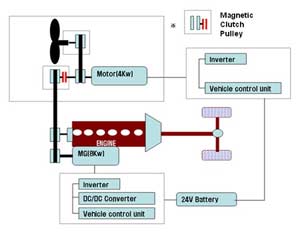Hyundai Motor Co. has developed a cost effective and fuel-efficient city bus that employs a mild hybrid system based entirely on Hyundai's proprietary technology. The application of a mild hybrid system to a commercial vehicle will accelerate the wider use of eco-friendly vehicles which reduce CO2 emissions and fuel costs.
The mild hybrid system uses an 8KW AC (alternating current) motor and generator which is used to automatically shut off the engine when the vehicle stops and to rapidly spin it back up when the driver releases the brake pedal. It also transforms wasted kinetic energy?during braking of the vehicle?into electrical energy which powers the engine??s cooling fan motor. Depending on driving conditions, a vehicle equipped with this mild hybrid system will be able to save between 15~20 percent in fuel costs.
This mild hybrid system can be easily applied to any diesel or CNG-powered vehicle and costs about one-fifth the price of a full hybrid system. While full hybrid systems can improve fuel efficiency by up to 50 percent compared to a conventionally-powered vehicle, their substantially higher initial cost results in a much longer payback period which make full hybrids less appealing to commercial vehicle fleet owners.
Hyundai Motor Co. will supply two city buses to a Suwon transit bus company in early April and 10 buses to another bus operator in Incheon at the end of April for fleet testing, which will be closely monitored. Hyundai plans to mass produce the mild hybrid city buses by the end of 2009. The company will complete the development of a full hybrid system by mid-year and the full hybrid buses are scheduled to go into the first fleet tests in the second half of this year.
Hyundai estimates that a city bus with the mild hybrid system will be able to cut about 6-8 million won in diesel fuel costs a year.
If the idle stop and go system is applied universally to all trucks and buses, the mild hybrid technology could play a key role in reducing emissions and CO2 and other hydrocarbons and help prevent global warming.

